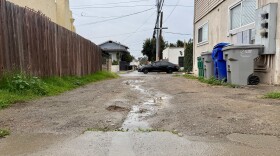LULU GARCIA-NAVARRO, HOST:
The polls are open in Mexico, and the man who's expected to win is a leftist who's vied for the presidency twice before. If Andres Manuel Lopez Obrador comes out on top, it could transform a country riven by violence and corruption. Over 100 election workers and candidates have been killed this election cycle alone, and Mexico is in an economic slump. We're joined now by NPR's Carrie Kahn, who's at a polling place in the state of Mexico. Good morning.
CARRIE KAHN, BYLINE: Good morning, Lulu.
GARCIA-NAVARRO: So where are you? And what are voters telling you?
KAHN: I'm in front of a school in a very working-class neighborhood, and I've been speaking to voters here. This is a - I came out here because the - inside the city of Mexico, it's a very - stronghold of Andres Manuel Lopez Obrador, the front-runner. And so everybody I talked to there was voting for him. So I came out a little bit farther. And this is more of a pre-the-ruling-party area.
And I've met a lot of people that aren't voting for Lopez Obrador here. They say they are worried about him having all the power, and they want to make sure they get out and vote for the Senate and the congressional legislators so that they give a little checks and balances there. But I have found some supporters, too. And everybody - it's pretty quiet, and everybody seems to be coming out to vote. We've seen a lot of long lines, and it seems pretty quiet so far.
GARCIA-NAVARRO: What does that tell you when you go to these two areas and one for and one against? I mean, a lot of people have predicted that this election could really divide the country.
KAHN: I think the country is polarized right now. We'll have to see how the vote comes out. Polls show Lopez Obrador with more than 50 percent of the vote. And that would be quite a mandate for him. So we'll have to see how the vote shakes out. And this country, toward the northern areas is more industrialized. People have very different voting records. He hasn't had that much of influence there. But polls show that he's doing pretty well there, too. His support is mostly in the center and down in the south. And then, we'll see how he does.
GARCIA-NAVARRO: So I mentioned the violence there in the run-up to this election. Are - is there a lot of security at the polling stations?
KAHN: Well, the first polling station that I went to in the city of Mexico, it - there was three cops. And they said they were going to be there all day, and it was very quiet. This place - when we pulled up, there was one patrol car here, and they had all their windshields cracked. And they didn't seem like they were really ready if anything actually happened, but they've since gone. And there isn't any security here, but it just seems very quiet. People are lining up and coming in and just seems to be a very tranquil atmosphere right now.
GARCIA-NAVARRO: So what is AMLO promising to do if, indeed, the polls are right and he wins?
KAHN: Well, his big No. 1 issue is corruption. He says he's going to fight corruption. He says it is the problem No. 1 of this country, causes crime. It causes poverty. It causes inequality. He wants to fight what he likes to call the mafia of power that he says has ruined this country. He says he's going to do it by leading by example. He's going to be hardworking, honest. He's going to get up at 6 a.m., work 16 hours a day and have a very austere government.
He also says - his stuff - what he talks about how he's going to fight crime, it's been sort of vague, not a lot of details. He's - he had talked about maybe amnesty for low-level drug offenders. But what - he really wants to strengthen the social fabric. He says that's what's needed in society today - better education, more jobs, strengthen the economy. He's promising quite a lot.
GARCIA-NAVARRO: That's NPR's Carrie Kahn in Mexico. Thank you so much.
KAHN: You're welcome. Transcript provided by NPR, Copyright NPR.






